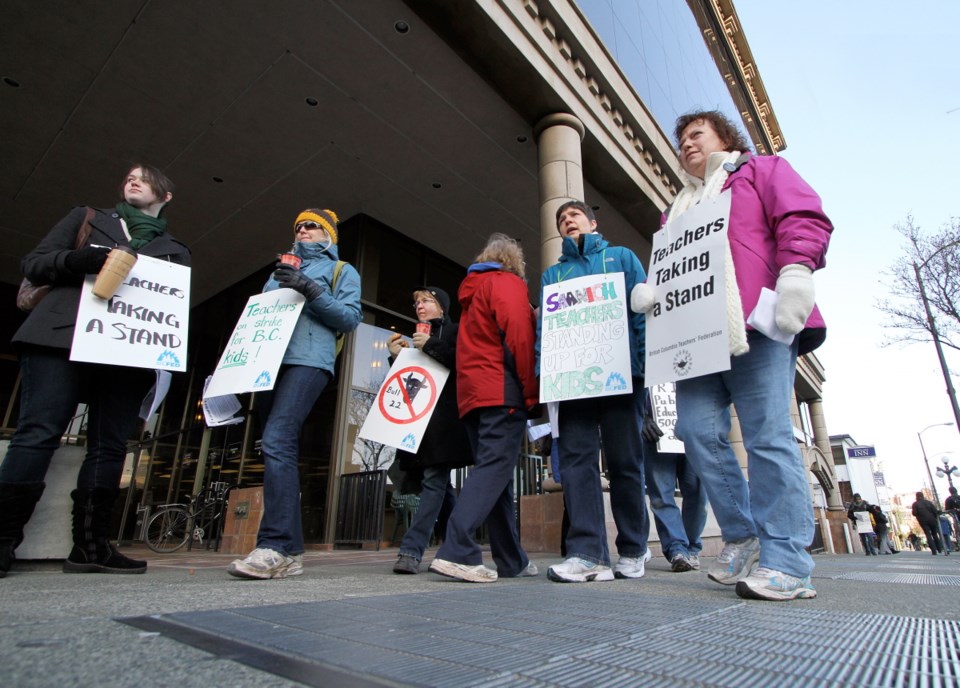The eternal argument over who sets class conditions in B.C. schools will continue.
But the B.C. Teachers’ Federation got thrown for a huge loss on Thursday, with a court decision that cancels what looked to be a return to pre-2002 standards on class size and compositions, something for which the union has fought for years.
The union had won two court cases in a row on the issues and was poised to see the victories solidified in the Court of Appeal.
Any new developments on the perennial issues of how to deal with special-needs children and set class-size standards will come from looking forward, not back. The BCTF’s 13-year dream of restoring strict formulas and provisions that were negotiated with the previous NDP government evaporated in the verdict. The legal arguments supporting that dream were methodically taken apart by the justices who reversed point after point in earlier Supreme Court conclusions.
BCTF President Jim Iker responded by demanding the government hire more teachers, put more money into education and drop a current education bill, for good measure. He had the air of a fighter who is down on the mat for the count, inviting the other guy to surrender. The union plans to appeal the decision to the Supreme Court of Canada, but has a statistically slim chance of getting there.
It’s hard to figure out who lost the most — the BCTF or the trial judge, Justice Susan Griffin. She handled both previous decisions and one of the most common phrases in the lengthy verdict on Thursday was: “The trial judge erred … ”
The Appeal Court shredded her entire approach to the case and most of her conclusions.
Griffin had ruled that the 2002 bill that removed those issues from bargaining was unconstitutional. Then last year, she ruled that a 2012 bill that was portrayed as an attempt to fix the deficiencies was also invalid.
The Appeal Court said the central question is whether the latter bill interfered with teachers’ right to a meaningful process through which they make could make collective representations and have them considered in good faith. The court concluded it did not.
It also rejected her incendiary findings that the government negotiated in bad faith three years ago during contract talks and had tried to provoke a strike for its own political advantage.
“The judge’s finding that the province did not consult in good faith was based on legal error and must be set aside,” said the Appeal Court. “In our opinion, the judge should not have assessed the substantive merit or objective reasonableness of the parties’ negotiating positions.”
The verdict cited various observations she made about the government position being “manifestly unreasonable,” “unduly alarmist,” based on “myth” and “fallacy” and ‘without any factual or analytical basis.”
The Thursday verdict said: “Courts are poorly equipped to make such assessments. What matters in this case is the quality of the consultation process itself and whether it gave teachers a meaningful opportunity to make collective representations … We find that it did.”
Griffin put much weight on the admission from then-negotiator Paul Straszak that the government had plans to pressure the union to escalate its strike action. But the Appeal Court said it’s normal practice to consider such tactics. “We see nothing sinister in the way the province recognized … the importance of the timing … and the circumstances under which it might escalate.”
The original bad-faith finding was the basis for a $2-million damages award that was paid out to the union last year. That was overturned along with everything else, and the money will be returned.
But the union gets to keep a much larger sum that was paid out to settle the bitter 2014 contract dispute. The contract signed last September after a series of school shutdowns included a disbursement of $105 million from the government to the union to cancel thousands of grievances that had been filed since 2002. They could have potentially cost far more than that. Officials said Thursday that since it was part of a negotiated labour contract, the payout stands and is not overturned by the verdict.
That’s about the only comfort the BCTF can take from the decision.



